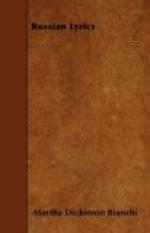of eight or nine years he was taken by his parents
to Petersburg where he was presented to the heir to
the throne, and allowed to play with his children.
The good will shown him at that time he never lost
throughout his entire life. The year following
he was taken to Germany, and while in Weimar was permitted
to visit Goethe, which made a lasting impression upon
him. Up to the age of seventeen when he took his
examinations for the University at Moscow, he lived
both in Russia and abroad. After the death of
his uncle, who made him his heir, he became attached,
by the wish of his mother, to the Russian Mission at
Frankfort. Later he returned to enter the Second
Division of the Chancellery of His Majesty. At
the time of the coronation of Alexander Second at
Moscow, he was appointed to become His Majesty’s
aide de camp; an honor he declined, not caring for
a military career. He was afterward made Chief
Master of the Royal Hunt, a position he held until
the day of his death. From the age of sixteen
he had always written poetry, but not until 1855 did
he begin to publish his lyrics and epics in the journals.
His passion for poetry was extended toward all other
forms of art. At thirteen years of age he made
his first journey through Italy,—to Milan,
Venice, Florence, Rome and Naples, and his soul grew
large with enthusiasm for every manifestation of beauty,
so that upon his return to Russia he was really homesick
for Italy. He said himself that it was solely
due to his passion for hunting that his poems were
written in the major key,—while those of
so many of his countrymen were written in the minor.
Count Tolstoy died on the 28th of September, 1875,
at his estates in the government of Tshernigow, where
he lies buried.
His most important works were a romance, a dramatic
poem, Don Juan,—and the dramatic trilogy,
The Death of Ivan the Terrible, Tsar Fedor Ivanowitsch
and Tsar Boris.
APOLLON NIKOLAJEWITSCH MAIKOW was born June 4, 1821,
at Moscow. His father was a painter; his brothers
had rendered important service to Russian literature
in history and criticism. As a boy he was instructed
in the literature of Russia by the afterward famous
Gontscharow. At the age of fifteen he began to
write verse. His original intention was to become
a painter, but the weakness of his eyes and his increased
devotion to poetry decided him otherwise.
He studied jurisprudence at the University of St.
Petersburg for several years, and his final collection
of poems was published in 1842, which was greeted
with enthusiasm by the famous critic Belinsky.
In the same year, using the gold he received from
the Emperor Nicholas I, he went abroad. He spent
nearly a year in Italy, heard lectures at the College
de France and the Sorbonne during his stay in Paris,
and spent some time in Prague. For a time he
served in the Ministry of Finance and from 1852 in
the Foreign Censorship office at Petersburg; being
President of that office at the time of his death
which occurred in March, 1897.




